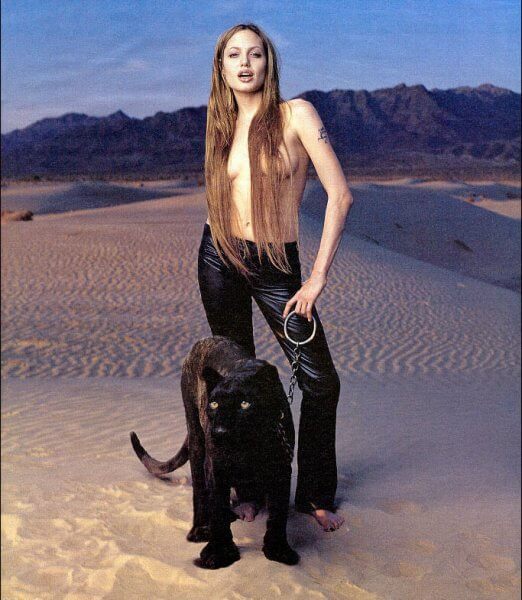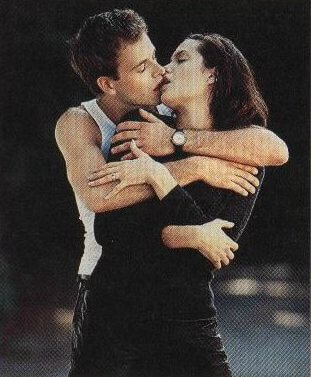Angelina Jolie is in the front room of her apartment in New York, giving what has become the obligatory tour of her tattoos. “OK,” she says, standing up and showing her left arm. “That’s my dragon, upper left.” She presents the inside of her wrist: “That’s an H — there are two people in my life who have this letter who I’m very close to and who I sort of love and cherish. And this is the newest one. I got this with my mom, actually — she came with me. It’s a Tennessee Williams quote: ‘A prayer for the wild at heart, kept in cages.” She regards her left forearm and smiles. “This is my cross,” she continues, pulling down the waistband of her black pants to reveal her slender hip, “and this” — she indicates a Latin motto that curves across her stomach just above the bikini line, “means `What nourishes me also destroys me.’ And this” — she turns around, pulling up the hem of her black T-shirt to show a little blue rectangle on the small of her back — “is the only color I have. I’m going to turn it black, and it’s a window. It’s because wherever I am, I always find myself looking out the window, wanting to be somewhere else.” She smiles again.

“My mom asked me if the prayer for the wild at heart was for me or if that was something that I thought had pained me throughout my life. But it’s for everybody I know. I don’t think I know one person who I think can be completely who they are every second of the day, who feels completely free. So it’s kind of a prayer for everybody to find their happiness, to break out. And Tennessee Williams also writes that an animal feels comfortable in a cage it grew up in — it represents security as well as confinement to be in that cage. So anything that makes us comfortable, those things are cages around us.”
The last few months, Angelina has been working in Los Angeles, and her living room has an unoccupied air. “People do always think that because I have tattoos, I’m bad,” continues Angelina, “or that there’s something very dark about me. And I’m probably the least morbid person. I’ve kind of discovered that if I think about death much more than some people have, it’s probably because I love life more than those people.”
Besides the tattoos, here’s another reason people might think there’s something dark about Angelina: There’s a little plaque by the sink in her bathroom that says, SOME DAYS IT’S NOT WORTH CHEWING THROUGH THE LEATHER STRAPS IN THE MORNING.
When she married actor Jonny Lee Miller, with whom she co-starred in her first theatrical release, the 1995 cyberthriller Hackers, and from whom she separated amicably last year, she wore black rubber pants and a white shirt with the groom’s name written on it in her blood. Yet you have to grant the logic of Angelina’s argument about her love of life rather than death. These things may raise eyebrows, but they’re signs of a passionate temperament, not a dark one. Except possibly the knives.
But she mostly keeps those in a drawer.
Angelina was born in the Los Angeles in 1975, but after her parents separated, when she was two, she moved to various places in and around New York with her mother, Marcheline Bertrand, and older brother, James Haven Voight. (Both children were given middle names they could use as stage names if they needed them.)
The family returned to Los Angeles when Angelina was eleven. “When we moved back from New York, I had gotten really into leather,” she says. “I think I loved Michael Jackson or something. I used to wear the leather jackets with the zippers, or collars with studs on them, and I used to ask if I could go to school wearing studs.”
“I never had a house growing up, I never had one home, I never had an attic that had old stuff in it. We always moved, lived in a lot of different apartments, and nobody ever owned anything, so I was never rooted anywhere. And I always really dreamed of having that attic of things that I could go back up and look at, or just anything, really — marks on the walls. And I feel like I’m very comfortable now living in hotels and not having that. But I also think I’m very drawn to some things that are tradition, that are roots, and I think that may be why I focused on funerals.”
Maybe this longing for stability is also why she got married at twenty? “Maybe,” she agrees. “That also had a lot to do just with committing very completely. Because it’s like I don’t have any pictures around of anybody else or of myself; I don’t have anything that represents the past, so I commit very much to things that are probably very sentimental to most people. Like committing very much to marriage and having that bond, that means a great deal to me.”
Angelina remains very close to her mother and brother. “I think we [her father Jon Voight] speak to each other a lot through our work. Like, you know, he met my husband and we’d go to dinner, but he still had his opinion of me as his daughter. So he can kind of watch a film and see how I am as a woman, the way I am dealing with a husband who’s been injured or the way I am crying alone. And it’s the same for me: I can watch films of his and just see who he is. But not growing up in the same house and feeling that he really did belong to the world. . . as I’ve gotten older I learned to communicate with him as a person.”
[She has done] quite a bit of work, especially considering that Angelina is only twenty-four. She considered taking a few months off between Girl, Interrupted and the movie she starts in the fall, but decided to do Gone in 60 Seconds because it was a fun project and she loves cars.
“We were looking for a very specific actress for The Bone Collector,” says director Phillip Noyce. “She had to be young, in her mid-twenties, with the strength to play a New York cop, as well as a very special vulnerability. The character comes into the life of the character played by Denzel Washington and reignites his will to live. And what I saw in Angelina’s performance as Gia was all those qualities: the strength and the vulnerability, and also a fearlessness, both in the character she portrayed and — I realized when I met her — as an artist. Funnily enough, the studio didn’t want her — they said, ‘Angelina who?’ Because as soon as the script came out, a lot of female actors came forward, including some very big names, who were willing to cut their fees to do the film. What finally happened was, in order to secure Angelina and Denzel, the studio put a cap on the budget and said the director and producer will pay the overages, to which we agreed. I put up a million dollars. But there was no one else.”
Angelina seems about a zillion times happier than the first time we met, when she was promoting Gia. “I probably wasn’t acting when I met you before,” she says when I mention this. “That was a really bad time, because I didn’t think I had that much more to offer. I didn’t think I could balance my life and my mind and my work. I was also very scared of getting public after doing that part and seeing how undernourished her private life was, how malnourished she was, though her exterior was very glamorous. So I’d be working and doing interviews, and then going home by myself and not knowing if I’d ever be in a relationship or be really good in my marriage or be a good mother one day or if I’d ever be . . . I don’t know, complete as a woman.
“It was a really sad time. But I think it was really good that I did that now, that I spent all those months on my own, having a very regular life, going to school at NYU, studying the different levels of how to get into this business, riding the subway back and forth and just being on my own.”

This was also the beginning of her separation from her husband. “We knew that we married young and that we needed to keep growing and that there would be times when we’d grow in different places and spend time apart,” she says. “But it was very difficult to separate from him.” There is a silence. “I don’t know how good a wife I was. And that’s the one thing that made it possible for me to be somewhat OK with us separating.” And what is a good wife? “Oh, I don’t know. Or maybe I actually do know now and I don’t know how that affects my thoughts of him. I’ve actually learned a lot about myself. But then I wasn’t sure what compromise was or what freedom was when you were always sharing everything — what was the positive and the negative side of that. We were working separately a lot, and maybe now I understand that it is good to have your individual journeys and it doesn’t have to separate you. And I think that probably because I just wasn’t feeling very good about myself, I just couldn’t imagine that I could be what somebody needed. And I think if you lose that kind of confidence, then you can lose your passion for someone. You don’t want to pursue them and say, ‘Be with me,’ because you think maybe they shouldn’t. I just wasn’t whole as a person, I guess, and now I know that you never are completely, and it doesn’t matter.”
“Angie always says the difference between her and Gia is that she has the outlet of acting as a way of making some sense of herself,” says Gia director Michael Cristofer.